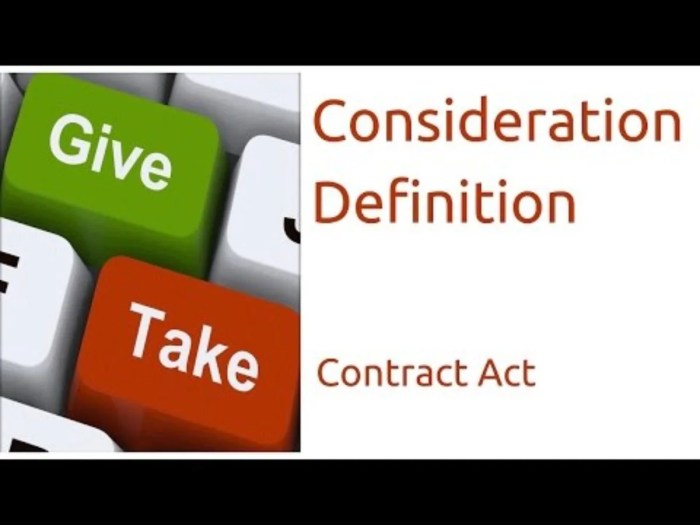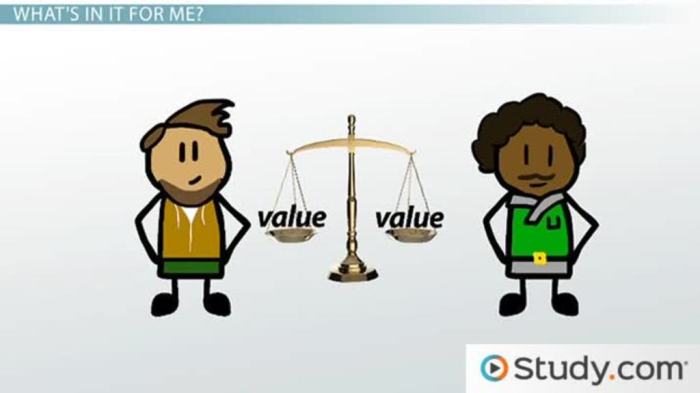
What is a consideration in contract law? It is a fundamental element that forms the backbone of any legally binding agreement. Consideration represents the value exchanged between parties, acting as the driving force behind their willingness to enter into the contract. It’s the “something of value” that each party promises to give or do in exchange for the other party’s promise. Without this essential ingredient, the agreement may be deemed unenforceable, leaving both parties without the legal protection they seek.
The concept of consideration is deeply rooted in contract law and plays a crucial role in ensuring fairness and balance. It serves as a safeguard against empty promises, guaranteeing that both parties have a tangible stake in the agreement. This article delves into the complexities of consideration, exploring its various forms, its significance in different contractual settings, and the consequences of its absence.
Elements of a Contract
A contract is a legally binding agreement between two or more parties that creates mutual obligations. For a contract to be valid and enforceable, certain essential elements must be present. These elements are the building blocks of a contract, and without them, the agreement may not be recognized as a legally binding contract.
Offer and Acceptance
An offer is a proposal by one party (the offeror) to another party (the offeree) to enter into a contract. The offer must be clear, definite, and communicated to the offeree. Acceptance is the offeree’s agreement to the terms of the offer. Acceptance must be unconditional and communicated to the offeror.
For example, if you advertise a car for sale for $10,000, you are making an offer. If someone calls you and says they will buy the car for $10,000, they have accepted your offer.
Consideration
Consideration is something of value that is exchanged between the parties to a contract. It can be a promise to do something, a promise not to do something, or the actual performance of an act. Consideration is essential because it ensures that both parties are receiving something of value in exchange for their promises.
Consideration is the price bargained for and paid for a promise. It is the inducement to enter into a contract.
For example, if you agree to paint someone’s house for $500, your promise to paint the house is consideration for the other party’s promise to pay you $500.
There are two main types of consideration:
- Executory Consideration: A promise to perform an act in the future. For example, if you promise to pay someone $100 to mow your lawn next week, this is executory consideration.
- Executed Consideration: The actual performance of an act. For example, if you mow your neighbor’s lawn and they pay you $20, this is executed consideration.
Capacity
Capacity refers to the legal ability of a party to enter into a contract. In general, individuals who are of legal age and sound mind have the capacity to contract. However, certain individuals may lack capacity, such as minors, individuals with mental incapacities, or those who are intoxicated.
For example, a 16-year-old cannot legally enter into a contract to purchase a car.
Legality
The subject matter of a contract must be legal and not against public policy. Contracts that are illegal or against public policy are void and unenforceable.
For example, a contract to commit a crime is illegal and unenforceable.
Intent
The parties to a contract must intend to create a legally binding agreement. This means that they must understand that they are entering into a contract and that they are bound by the terms of the agreement.
For example, if two people are joking about a deal and don’t intend to be legally bound, then no contract exists.
Past Consideration
Past consideration refers to an act or forbearance that occurred before the promise was made. It is generally not considered valid consideration in contract law. This means that a promise made in exchange for something that has already been done is not legally enforceable.
Why Past Consideration is Not Valid
Past consideration is not valid because it lacks the element of bargained-for exchange, which is essential for a legally binding contract. For consideration to be valid, it must be given in exchange for the promise. In the case of past consideration, the act or forbearance has already been performed, and the promise is made after the fact. Therefore, there is no mutual exchange of promises or actions.
Exceptions to the Past Consideration Rule
While past consideration is generally not valid, there are some exceptions to this rule. These exceptions arise when the act or forbearance was performed in reliance on a promise that was subsequently made.
Promissory Estoppel
One exception to the past consideration rule is promissory estoppel. This doctrine allows a court to enforce a promise even if there is no consideration if the following elements are met:
- A clear and unambiguous promise was made.
- The promisor reasonably expected the promisee to rely on the promise.
- The promisee did rely on the promise to their detriment.
- Injustice would result if the promise were not enforced.
For example, if a company promises an employee a bonus for their hard work, and the employee relies on that promise to make financial decisions, the company may be estopped from denying the bonus, even though the promise was made after the work was already completed.
Pre-Existing Duty
The principle of pre-existing duty states that performing or promising to perform an action you are already legally obligated to do does not constitute valid consideration. In essence, this means that you cannot use something you are already required to do as a bargaining chip to get something else in return.
Examples of Pre-Existing Duty
The pre-existing duty rule applies to various situations, including:
- Employment Contracts: If an employee is already obligated to perform certain tasks under their employment contract, promising to do those same tasks in exchange for a raise or promotion may not be considered valid consideration. For instance, if a sales representative is already obligated to meet a certain sales quota, promising to meet that quota in exchange for a bonus may not be legally binding.
- Contracts with Government Entities: When a contractor has a pre-existing contract with a government agency to perform certain services, promising to perform those services in exchange for additional compensation may not be considered valid consideration. For example, if a construction company is already contracted to build a school, promising to complete the project on time in exchange for an additional payment may not be legally enforceable.
Exceptions to the Pre-Existing Duty Rule
While the pre-existing duty rule generally prevents using existing obligations as consideration, there are exceptions:
- Modification of the Original Contract: If the parties agree to modify the original contract, and the modification involves a new promise or obligation that goes beyond the original pre-existing duty, it can be considered valid consideration. For example, if a construction company agrees to complete a project ahead of schedule in exchange for an additional payment, this modification may be legally enforceable.
- New Promise Made in Exchange for Additional Performance: When a party makes a new promise in exchange for additional performance beyond their pre-existing duty, it can be considered valid consideration. For example, if an employee is asked to work overtime and is promised a bonus for doing so, this new promise can be legally binding as it involves additional performance beyond the employee’s regular duties.
Consideration and the Enforcement of Promises

Consideration is a crucial element in contract law that ensures fairness and prevents parties from being bound to promises made without something of value exchanged. This principle, often described as “something for something,” plays a vital role in determining whether a promise will be legally enforceable.
The Significance of Consideration
The presence or absence of consideration directly impacts the enforceability of a promise. If consideration exists, the promise is generally considered legally binding and can be enforced in a court of law. However, if consideration is lacking, the promise is deemed unenforceable, and the party making the promise is not legally obligated to fulfill it. This principle helps prevent situations where one party takes advantage of another by making promises without any intention of fulfilling them.
Illusory Promises
An “illusory promise” is a statement that appears to be a promise but lacks the essential element of consideration. It is a promise that is not binding because it is conditional on an event that may never occur or leaves the promisor with complete discretion to perform or not. For example, a promise to buy a car “if I feel like it” is illusory because the promisor has no obligation to buy the car. The promisor has not committed to a specific action, and the promise is essentially empty.
Examples of Unenforceable Contracts Due to Lack of Consideration
- Promises to Make Gifts: A promise to give a gift, without any expectation of something in return, is generally not enforceable. This is because there is no consideration for the promise. For example, a promise to give a friend $10,000 is not legally binding unless the friend provides something of value in return, such as performing a service.
- Promises Based on Past Consideration: A promise based on past consideration is typically unenforceable. This is because the consideration for the promise occurred before the promise was made. For example, if a friend helps you move and you later promise to pay them $500, your promise is not enforceable because the friend’s help was already performed.
- Pre-Existing Duty: A promise to perform an act that a party is already legally obligated to do is not considered valid consideration. For example, if a police officer promises to investigate a crime, this promise is not enforceable because the officer is already obligated to investigate crimes as part of their job.
- Promises to Perform an Act that is Already Legally Obligated: If a party promises to do something they are already legally obligated to do, that promise is not considered valid consideration. For example, if a construction worker promises to complete a project on time, this promise is not enforceable because the worker is already obligated to complete the project on time under the terms of the contract.
Consideration in Different Contractual Settings

The concept of consideration is a fundamental principle in contract law. It ensures that both parties to a contract are receiving something of value in exchange for their promise or performance. Understanding how consideration applies in various contractual settings is crucial for understanding the enforceability of contracts.
Consideration in Sales Contracts
Consideration in sales contracts involves the exchange of goods for money or other valuable consideration. The seller’s promise to deliver the goods is supported by the buyer’s promise to pay the purchase price, and vice versa. For example, in a contract for the sale of a car, the seller’s promise to deliver the car is supported by the buyer’s promise to pay the agreed-upon price.
Consideration in Employment Contracts
In employment contracts, the employer’s promise to pay wages is supported by the employee’s promise to perform the agreed-upon work. This exchange of promises constitutes consideration. The employee’s performance of the work is considered valuable consideration, even if it is not specifically stated in the contract.
Consideration in Real Estate Contracts
Consideration in real estate contracts is typically the exchange of property for money. The seller’s promise to convey title to the property is supported by the buyer’s promise to pay the purchase price. This exchange of promises is considered valuable consideration. In addition to the purchase price, other forms of consideration in real estate contracts can include:
- Down payments
- Mortgage financing
- Assumed mortgages
- Promises to perform specific actions, such as repairs or improvements
Comparison of Consideration in Different Contractual Settings, What is a consideration in contract law
The following table highlights the key similarities and differences in the application of consideration in different contractual settings:
| Setting | Consideration | Example |
|---|---|---|
| Sales Contracts | Goods for money or other valuable consideration | Buyer promises to pay $20,000 for a car in exchange for the seller’s promise to deliver the car. |
| Employment Contracts | Wages for work | Employee promises to work for the employer in exchange for the employer’s promise to pay wages. |
| Real Estate Contracts | Property for money or other valuable consideration | Buyer promises to pay $500,000 for a house in exchange for the seller’s promise to convey title to the property. |
Concluding Remarks

Understanding the concept of consideration is essential for anyone involved in contract formation. It empowers individuals and businesses to craft agreements that are both legally sound and mutually beneficial. By recognizing the value exchanged and ensuring its presence in every agreement, parties can foster trust and confidence, solidifying their legal standing and protecting their interests. As you navigate the world of contracts, keep in mind that consideration is not just a legal technicality; it is the cornerstone of a fair and enforceable agreement.
FAQ Compilation: What Is A Consideration In Contract Law
What happens if there is no consideration in a contract?
If a contract lacks consideration, it may be deemed unenforceable. This means that a court may not uphold the agreement, and the parties may not be able to legally compel each other to perform their obligations.
Can a promise to do something I’m already obligated to do be considered valid consideration?
Generally, no. Performing a pre-existing legal duty is not considered valid consideration. For example, if you are already legally obligated to pay rent under a lease agreement, promising to pay that rent cannot be considered new consideration for a separate agreement.
What are some examples of consideration in real estate contracts?
In real estate contracts, consideration often takes the form of the purchase price paid by the buyer for the property. This is the “something of value” exchanged between the parties.




